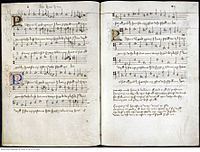Benutzer:Feuerrabe/Pastime with good company
aus Wikipedia, der freien Enzyklopädie
Pastime with good company, auch bekannt als The King's Ballad (dt: "Des Königs Lied") ist ein englisches Volkslied, das von König Heinrich VIII. im frühen 16. Jahrhundert verfasst wurde.
Entstehung
Heinrich VIII. verfasste viele weitere Lieder, zudem sind mindestens fünf Instrumentalstücke, zwei Messen und eine Motette von ihm überliefert.[1] Das Lied ist in drei zeitgenössischen Niederschriften erhalten: einmal im Manuskript Heinrichs VIII. (British Library, MS Add. 31922 ff. 14v-15) sowie in zwei verschiedene Versionen des Ritsons Manuskripts (British Library, MS. Add. 5665, ff. 136v-137 und 141v-142[2]
Liedtext
| Original (Frühneuenglisch) | Modernes Englisch | Deutsch |
| Passetyme with gude companye, | Pastime with good company, | |
| I love, and shall until I dye. | I love, and shall until I die. | |
| Gruch who wyll, but none deny, | Grudge who will, but none deny, | |
| So God be pleeyd, thus lyfe wyll I. | So God be pleased, thus live will I. | |
| For my pastaunce: | For my pastance: | |
| Hunt, syng, and daunce, | Hunt, sing, and dance, | |
| My hert ys sett! | My heart is set! | |
| All gudely sport, | All goodly sport, | |
| Fore my comfort, | For my comfort, | |
| Who shall me lett? | Who shall me let? | |
| Youth wyll have nedes dalyaunce, | Youth must have some dalliance, | |
| Of gude or yll some pastaunce, | Of good or ill some pastance. | |
| Companye me thynketh them best, | Company methinks them best, | |
| All thouts and fansyes to dygest. | All thoughts and fancies to digest. | |
| For ydleness, | For idleness, | |
| Ys chef mastres | Is chief mistress | |
| Of vyces all: | Of vices all: | |
| Than who can say, | Then who can say, | |
| But myrth and play | But mirth and play, | |
| Ys best of all? | Is best of all? | |
| Companye with honeste, | Company with honesty, | |
| Ys vertu, vyce to flee. | Is virtue, vice to flee. | |
| Companye ys gude or yll, | Company is good and ill, | |
| But ev'ry man hath hys frewylle. | But every man has his free will. | |
| The best ensyue, | The best ensue, | |
| The worst eschew, | The worst eschew, | |
| My mynd shall be: | My mind shall be: | |
| Vertue to use, | Virtue to use, | |
| Vyce to refuse, | Vice to refuse, | |
| Thus shall I use me! | Thus shall I use me! |
Weblinks
Literatur
Stevens, John: Music and Poetry in the Early Tudor Court (Cambridge studies in music), Cambridge University Press, London, 1979
